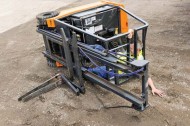 David Ellison, chief executive of the Fork Lift Truck Association, explains the crucial role which fork lift training should play in Britain’s workplaces.
David Ellison, chief executive of the Fork Lift Truck Association, explains the crucial role which fork lift training should play in Britain’s workplaces.
Three years ago, the Fork Lift Truck Association introduced National Fork Lift Safety Week, in a bid to reduce the number of British fork lift truck accidents attributable to human error – whether through complacency or a lack of basic safety procedures.
Since then we have seen a steady decline in the number of accidents involving fork lift trucks and – as an Association – we are determined to reduce them still further. There is certainly no room for complacency here.
The operation of fork lift trucks is the single biggest factor in industrial transport accidents. Newly released HSE statistics show that 369 serious accidents – resulting in amputations, fractures and other injuries needing a hospital stay – were recorded in 2009/2010.
That’s one per day… and, in many of these cases, better training provision would have significantly reduced the accident risk.
However, this is just the tip of the iceberg. Industry-wide research from Skills for Logistics (Dec. 2010) indicates that more than half of all employees working with and alongside fork lift trucks are not sufficiently trained to do so.
 Trainers believe budget cuts, staff shortages and a lack of management awareness regarding the duty to train are behind this dangerous shortfall. Whatever the causes may be, by neglecting to ensure appropriate training levels, employers are placing lives, limbs and businesses at risk.
Trainers believe budget cuts, staff shortages and a lack of management awareness regarding the duty to train are behind this dangerous shortfall. Whatever the causes may be, by neglecting to ensure appropriate training levels, employers are placing lives, limbs and businesses at risk.
The law is clear about management’s duty of care in this crucial area.
Under the Health and Safety at Work Act 1974, employers are required to provide whatever information, instruction, training and supervision is necessary to ensure employees’ health and safety in the workplace.
The Management of Health & Safety at Work Regulations 1999 expands on this. It identifies situations where training is particularly important, such as when a new employee starts, is exposed to new or increased risks, or where existing skills may be in need of refreshing.
Further guidance on the crucial subject of training is found in the HSE publication Rider-Operated Lift Trucks: Operator Training – Approved Code of Practice and Guidance (L117).
Keep informed
The Fork Lift Truck Association (FLTA) is the UK’s independent authority on fork lift trucks, and your first port of call for information and advice on lift truck and materials handling issues. If you own or operate a fork lift truck, membership of the Association’s Safe User Group (SUG) provides you with all the relevant information you need to keep your business operating safely, legally and productively… in clear, concise terms.
 For further information on the FLTA and the Safe User Group, visit www.fork-truck.org.uk today.
For further information on the FLTA and the Safe User Group, visit www.fork-truck.org.uk today.




Comments are closed.